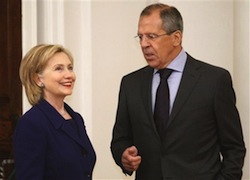US-Russia Remain Committed to Finishing New START
March 10, 2010
Featured Image
We are happy to serve you a daily summary of the day's top nuclear policy stories each morning, with excerpts from the stories in bullet form.
Stories we're following today:
Delay on Arms Pact Slows Reset of U.S.-Russia Ties - The New York Times [link]
- The fitful effort to fashion a [new arms control] treaty that would be a signature achievement of his presidency has demonstrated the hurdles Mr. Obama faces in his drive to reset relations with Russia after years of tension.
- After months of delay and discord, administration officials said, they have learned that when it comes to deal-making with Moscow, nothing is done until it is done, and rarely will it go as smoothly as anticipated.
- Underscoring his determination to seal the deal, he sent Ellen Tauscher, the under secretary of state for arms control, to Geneva to help resolve remaining differences.
- Secretary of State Hillary Rodham Clinton plans to travel to Moscow next week.
- Russia’s foreign minister, Sergey V. Lavrov, predicted Tuesday that the treaty could be finished by the end of the month. “We would push for a conclusion in two to three weeks.”
Senator Feingold Statement on a New START Treaty - The Congressional Record [link]
- Senator Russ Feingold (D-WI) took to the Senate floor yesterday to support the Obama administration's efforts to sign a new START treaty.
- Feingold said, "It is in the national security interest of the United States to reach an agreement with Russia to reduce the number of nuclear weapons and ensure that strong verification and transparency measures remain in effect."
- He continued: "I am encouraged that efforts to negotiate a START follow-on agreement have bipartisan support among national security experts. Notably, the bipartisan Congressional Commission on the Strategic Posture of the United States, headed by former Defense Secretaries William Perry and James Schlesinger, endorsed a follow-on agreement to START."
- Feingold concluded saying, "We must act now to address the spread of nuclear weapons and materials, which is one of the gravest dangers facing the United States."
Testing the No-New-Nuclear-Weapons Pledge - Hans Kristensen for the Federation of Atomic Scientists [link]
- One of the important tests of Obama Administration’s nuclear nonproliferation policy will be whether the long-delayed Nuclear Posture Review will approve new nuclear weapons.
- During his election campaign, Barack Obama promised not to build new nuclear weapons, a pledge that recently has been reiterated by the administration.
- Yet the Air Force’s budget request for 2011 includes several projects that, if approved, would contradict the pledge.
- Nuclear weapons modernization programs risk triggering a contentious debate similar to the dispute over the RRW and whether Obama’s no-nuclear-weapons pledge can be trusted.
- Government officials have to be crystal clear when they present the results of the NPR to make sure the administration’s nonproliferation policy doesn’t get stuck in the mud of misunderstandings and contradictions about what constitutes a “new” nuclear weapon.
Saddam Hussein Weighed Nuclear 'Package' Deal in 1990, Documents Show - The Washington Post [link]
- As troops massed on his border near the start of the Persian Gulf War, Iraqi President Saddam Hussein weighed the purchase of a $150 million nuclear "package" deal, according to documents uncovered by a former U.N. weapons inspector.
- The offer, made in 1990 by an agent linked to disgraced Pakistani scientist Abdul Qadeer Khan, guaranteed Iraq a weapons-assembly line capable of producing nuclear warheads in as little as three years.
- But Iraq lost the chance to capitalize when, months later, a multinational force crushed the Iraqi army and forced Hussein to abandon his nuclear ambitions.
- The newly uncovered documents suggest that Khan's offer of nuclear assistance was more comprehensive than previously known.
A View from the Dark Side
No Need to Ban the Bomb - LA Times [link]
- So how worried should we be [about nuclear weapons proliferation]? Not very. These threats, though serious, are overstated.
- The second overstatement is that a catastrophic terrorist nuclear attack against the United States is inevitable. Eight and a half years after the horrific 9/11 terrorist attacks, we have not had the atomic attack on our soil that many experts predicted.
- We often portray the post-9/11 world as far more volatile and unsafe than the supposedly stable decades of the Cold War.
- In fact, nuclear proliferation pressures were greater, our adversaries more ruthless and powerful, and the risks of a nuclear catastrophe higher 40 years ago.



